Fermented elderberry honey is a delicious way to harness the herbal properties of elderberries, combined with the goodness of fermentation. This recipe is perfect for making when elderberries are ripe in the fall, and it’s simple to throw together.
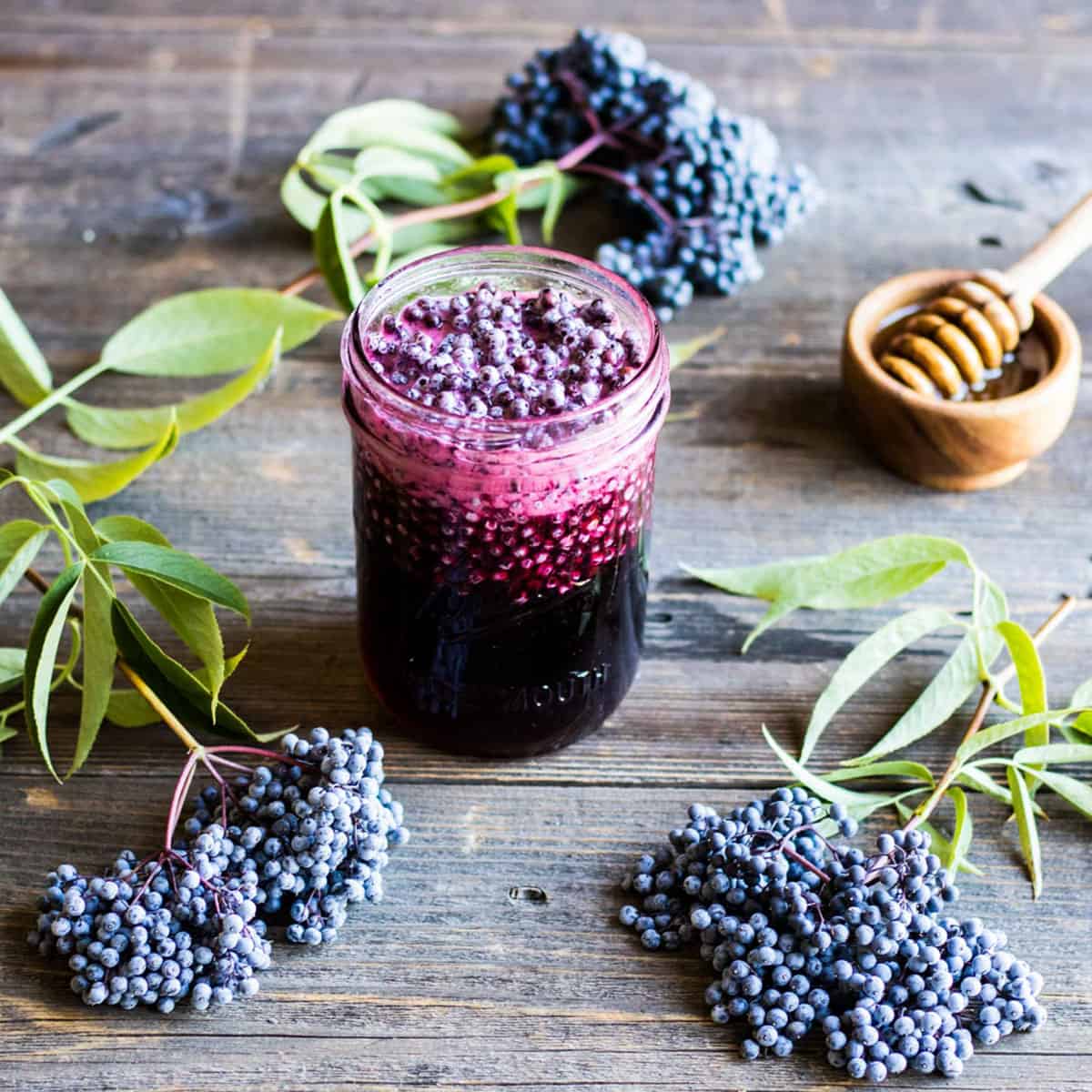
Want to save this post for later?
I want to make all elderberry recipes when elderberry season is here. Sometimes, I need a quick and simple recipe that makes it easy to use fresh ingredients.
Ever since I made my fermented honey garlic and fermented honey cranberries, I’ve been interested in making more fermented honey recipes. They are so easy to make and have tons of helpful herbal properties.
So, the first thing that came to my mind when I came across fresh elderberries was to make fermented elderberry honey!
Wildcrafting Weeds
If you want to learn more about the edible and medicinal weeds that surround us and how to use them, check out my eBook: Wildcrafting Weeds: 20 Easy to Forage Edible and Medicinal Plants (that might be growing in your backyard)!
Using Elderberry
Elderberries have tons of outstanding herbal properties. They are an excellent choice for fermenting in raw honey for even more support during fall and winter.
Studies have shown that elderberries have a significant effect on reducing the duration of colds and their associated symptoms. Although further studies are needed, the antiviral properties of elderberries have also been linked to reducing the duration of influenza.
Elderberries contain polyphenols and lectins, which have been shown to give them the ability to inhibit coronaviruses. They are best used when you know you’ve been exposed or at the onset of a cold or flu.
Elderberry syrup is also an excellent way to use the herbal properties of elderberries!
Further studies are needed to understand the full scale of qualities that raw honey has. However, there is remarkable evidence to support the positive effects of raw honey’s antibacterial, anti-inflammatory, and antioxidant properties.
Get more winter wellness recipes for teas, infusions, syrups, honey ferments, oxymels, and gummies in my ebook Herbal Immune Support: Homemade Recipes for Wellness!
Elderberry Safety
Elderberries are easy to forage for and grow in many locations. They have become increasingly popular in recent years due to their potential to shorten the duration of viral infections.
Note: It’s important to remember that elderberry stems, leaves, and unripe berries are toxic. Be sure to remove all of those before making this recipe.
The easiest way to remove the berries from their stems is to freeze the clusters whole. Once frozen, the berries pop right off.
Red elderberries should not be used in this recipe, as they are toxic when raw.
Black and blue elderberries sometimes have a tiny amount of toxicity when raw, mainly in the seeds, which can cause stomach upset in some people.
The fermentation process in this recipe removes any small amount of toxicity that may be there. Out of an abundance of caution I recommend straining out the berries before consuming the fermented elderberry honey.
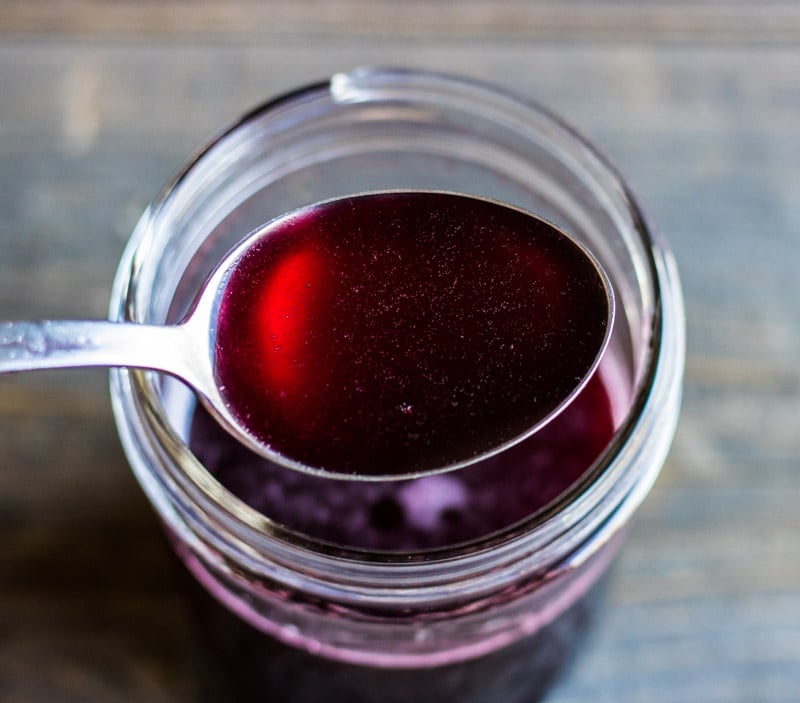
Fermented Elderberry Honey Recipe
When fresh elderberries are combined with raw honey, the moisture content, along with the natural yeast that is present on the surface, creates an environment that is perfect for fermentation.
Simply combine fresh elderberries in jar with raw honey.
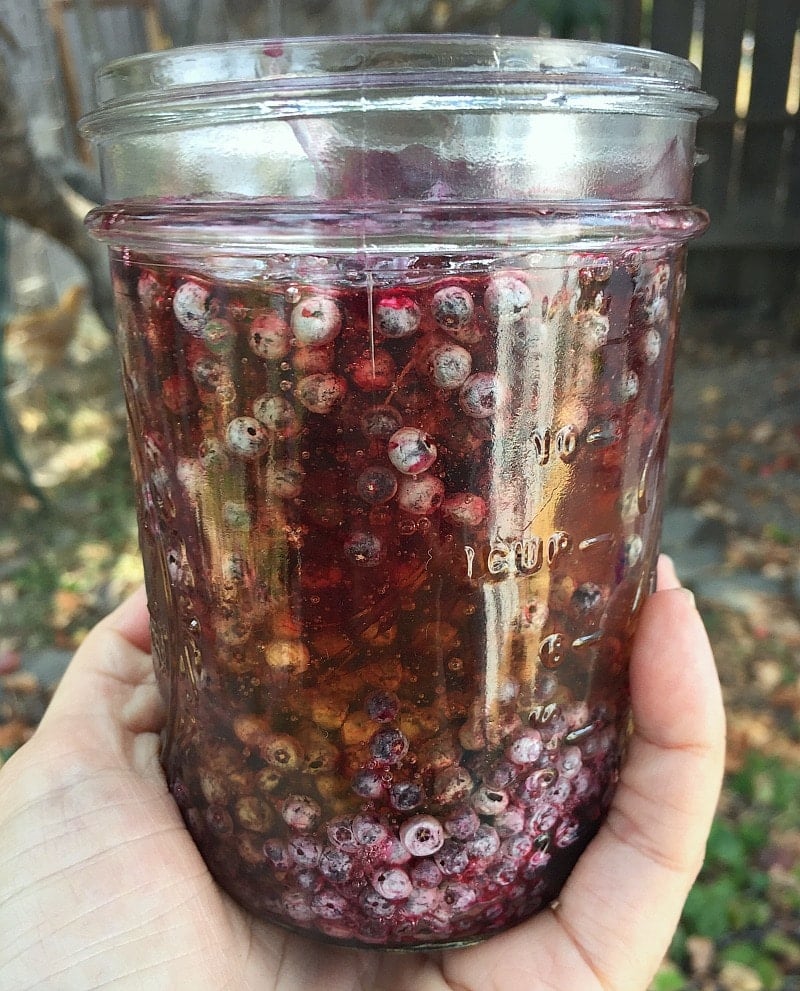
Cap it with a lid (use parchment paper in between if you are using a metal lid) and turn it over for 30 minutes or so to coat all of the elderberries with honey.
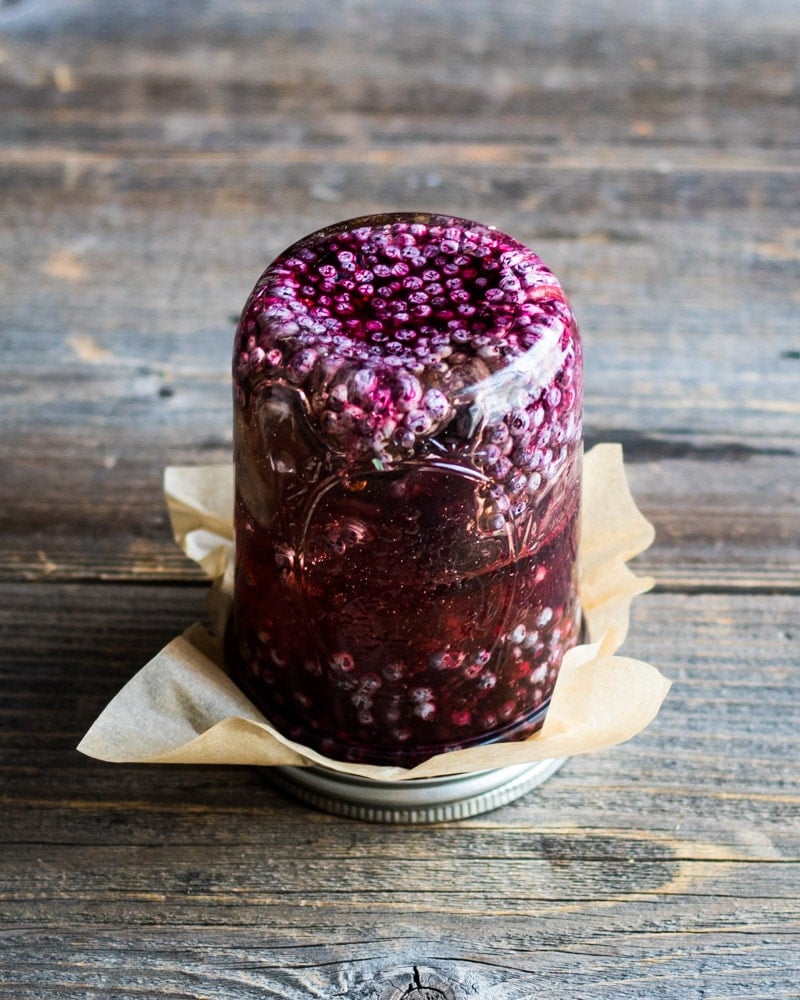
Then, turn upright and loosen the lid to let fermentation gases escape. Let it ferment in an out-of-the-way spot, and in 2-3 days, you should start to notice some bubbles forming.
It helps to tighten the lid and turn the jar for the first few days, just remember to re-loosen the lid afterward.
After a few weeks, you will really start to see a lot of bubbles! At this point, it is ready to use. Strain out the elderberries before consuming.
Using Dried Elderberries
You can use dried elderberries instead of fresh if you would like, but they will need to be rehydrated in water before combining with the honey. Otherwise, it’s just an elderberry infused honey. Which is also supportive, but not fermented.
My favorite place to get organic dried elderberries is Mountain Rose Herbs.
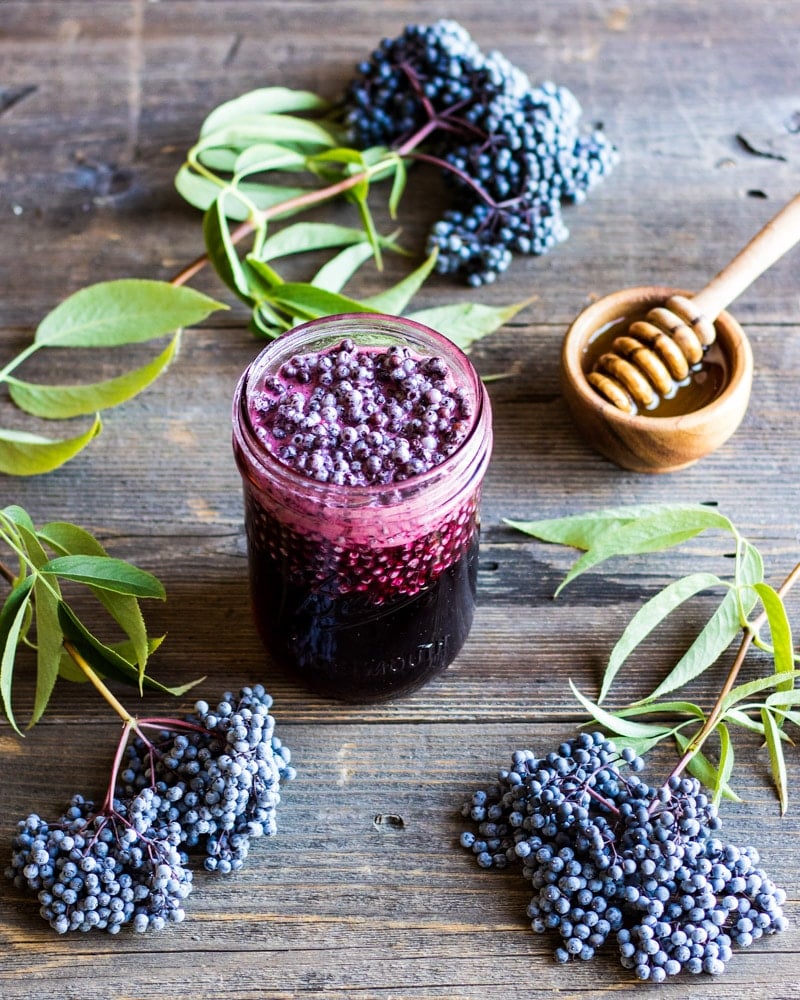
Let me just say this: this fermented elderberry honey is so delicious! It tastes like something that you would put on top of ice cream. Yum!
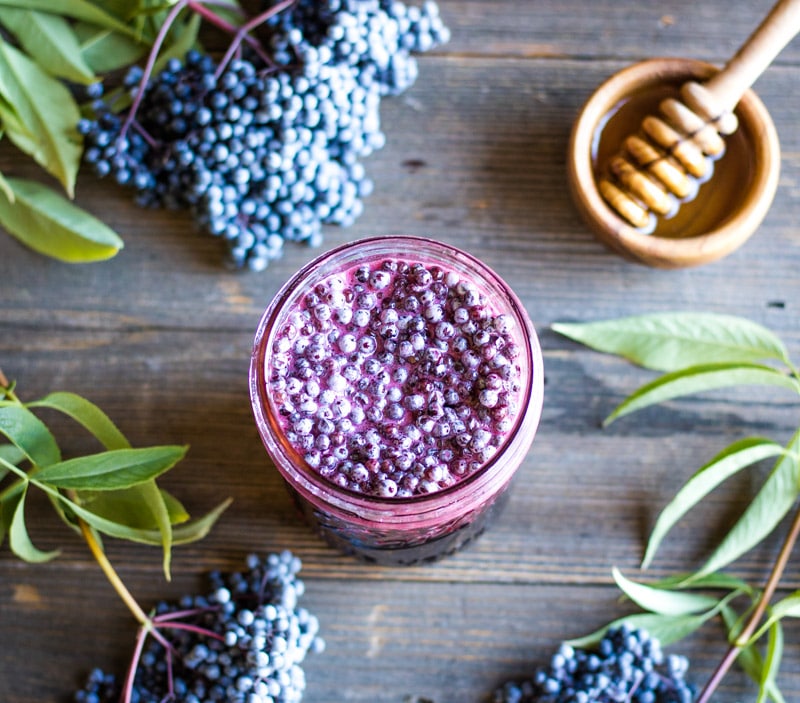
I love combining all of my favorite things like this. Take a foraged ingredient like elderberries and ferment it into a delicious tasting herbal recipe!
Elderberries are such an important part of anyone’s herbal apothecary, and this is probably my new favorite way to use them.
This is one recipe that you will definitely have to try this season – trust me!
I have some exciting news! My book, Healing Herbal Infusions, is available right now! It includes all types of infusion recipes including a few honey ferments similar to this one. Woo hoo!
More Elderberry Recipes
Show your immune system some extra love and discover your favorite way to enjoy elderberries!
- Fermented Elderberry Soda
- Immune Boosting Tea with Elderberries
- Elderberry & Echinacea Tincture
- Elderberry Mead
- Elderberry Gummies
- Elderberry Cocktail
Fermented Elderberry Honey
Ingredients
- 1 cup fresh black or blue elderberries (do not use red elderberries)
- 1-1.5 cups raw honey
Instructions
- Put the elderberries into a pint sized mason jar, then add the honey to cover the berries leaving at least an inch of head space at the top of the jar.
- Cap the jar with a plastic storage lid or use a piece of parchment paper underneath the metal lid. Invert the jar for about 30 minutes or longer to make sure that all of the elderberries are coated with honey.
- Turn the jar upright again. After the elderberries and honey have settled and all of the air bubbles are gone you may need to add a bit more honey to cover the berries.
- Loosen the lid to allow air to escape during fermentation and place the jar somewhere out of the way. For the first 2-3 days it is helpful to invert the jar daily then turn it upright again. Be sure to tighten the lid before inverting then loosen again once upright.
- Within about 2-3 days (could be longer in cooler temperatures) you should begin to see small bubbles on the surface and the honey will be noticeably runnier.
- After one or two weeks you will see a lot of bubbles! Give it a stir now and then and it will really bubble up. The honey is ready at any point after this and will continue to slowly ferment for weeks and months.
- Strain out the elderberries before consuming.
- Take a spoonful two to three times per day when you feel a sickness coming on to shorten the duration of a cold or flu.
Notes
- You can use dried elderberries instead of fresh if you would like, but they will need to be rehydrated in water first before combining with the honey.
- Serving: Take a spoonful two to three times per day when you feel a sickness coming on to shorten the duration of a cold or flu.
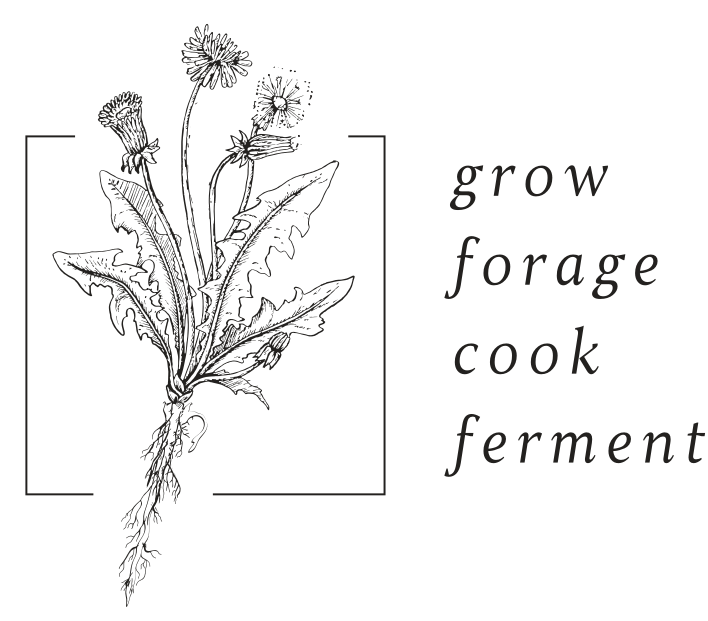
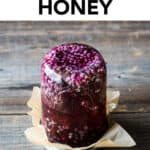
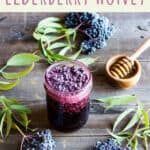
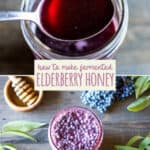
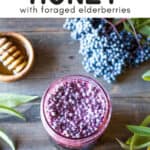
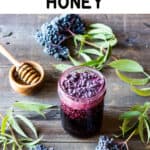
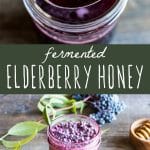
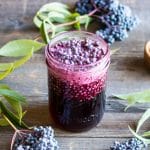

My new neighbours in France were horrified when I sent them a photo of something I made and they saw the elderberries in a bowl next to it. ‘ They are poison’ they said. When I explained that the only fruit that was about and not rationed for years after WW2 in the UK was that in the hedgerows …………….And, that we often ate them raw…………… and I’m now in my 77th year and in as good health as someone of my age……………….!!! Isn’t it strange how ‘black’ fruit can be labelled as poison ? OK, the taste raw is a little strange, but……………. Even though I told them about the benefits, I don’t think they were convinced………….
Hi Gillian. Raw elderberries are poisonous and should be cooked prior to consuming.
In the equipment needed it say fine mesh seive what is it used for I couldn’t find it in the recipe? Thank you great recipe
It’s used to strain out the elderberries! You can use a typically kitchen strainer if that’s what you have!
Love this way of getting the medical properties of elderberries and honey! I made it last fall but forgot about it until this Summer – and now it tastes like alcohol! Is it still safe to strain and consume?
Hi Lauren, it should be fine, but if you’re hesitant, add a splash of apple cider vinegar to bring down the pH.
How do you store fermented elderberry honey?
In a cool, dark pantry.
Hello! I’m in Australia and I’ve only seen the red variety, and that’s in my garden. I am making a raw honey garlic, ginger ferment & want to now add elderberry. Since they’re the red variety, do I need to cook them? Can I add cooked Elderberry to the raw honey ferment? Or can it still be raw if I strain them out? Thanks!
The fermentation process eliminates the toxicity in elderberry fruit, see my recipe for fermented elderberry honey. Because you’ll need to strain out the seeds, it would probably be easiest if you fermented the garlic and ginger together and the elderberry separately then added the elderberry honey to the garlic/ginger honey.
Question. I made my elderberry syrup this year with some local honey which I’m sure was raw…very clear colored.
After a few months my syrup in the fridge is hardening, similar to how honey does on the shelf but not quite that extreme. I have to set it out and shake it.
When I get it all mixed it’s super grainy like I’m eating liquid sugar. Any ideas what’s up? Never had this happen
It sounds like the honey has crystalized. I would place the jar in a bowl of warm water to help the honey dissolve.
I just realized that the honey I used wasn’t the raw but it was a local honey from the Amish store here in our town. I’ve had it sitting for a week, inverting it every few days. Do I need to heat up the elderberry honey or can I just eat it as is? If I have to heat it do I just bring everything to a low boil? Thanks in advance.
If your honey doesn’t ferment, you’ll need to cook the entire batch to make it edible.
Ok thank you! I did give it a stir just now and there were some bubbles on the top. So not sure if I leave it another week to see what happens.
Hello.. I’m Rose.. I forgot to rehydrate my berries..yup poured honey over dried berries..been sitting for about 3month..any suggestions as to what I can do to save my honey and berries?
Thank you,Rose
Hi Rose. The honey won’t ferment since the berries are dried, but it’s not a lost cause. It just means you now have an elderberry infused honey, which will taste great and have some of the medicinal benefits.
Hello you’re amazing! I have done this. I just need to know if I can store this without burping it all the time. How do ppl preserve fermented things? I’ve made a few ferments and am confused about that. Would love to know before I try more. I can’t turn the jar over because it has an airlock. I need my airlock for other things after this is done. One love – kelsey rose
Fermented foods is preservation! The honey is perfectly fine stored in a cool pantry or kitchen cabinet. For other fermented foods, pickles, kraut, etc., refrigerating is the way to go since it prevents the food from continuing to ferment and turn to mush.
Is it safe to consume the honey if it doesn’t ferment? I used rehydrated berries, but it seems it won’t ferment. I wonder if I should throw it away, cook it, or if it is safe as it is. Thank you!
If the elderberries were dehydrated at some point, that means they reached a high enough temperature in the dehydrator to destroy any toxicity, so they are safe to consume. I would strain the berries out and keep the infused honey for use.
I have elderberries from my property that I froze. Can I thaw them and use them thr same as fresh,or will there be too much moisture?
Yup, that’s fine!
Looking forward to trying this.
How long will it keep if refridgerated?
thank you!
Honey doesn’t need to be refrigerated. It’s best when kept in a cool pantry and should last a a few months.
Thank you very much for this, I have quite a few Elderberry trees / shrubs in my garden and I have been at a loss as to what to do with all those berries I end up with, and I don’t want them all to be going to the birds which live in our backyard!
Hi, When I rehydrate dried elderberries, I saw you said just cover with water. How long does it take and how can I tell they’ve been rehydrated enough to work in the ferment?
Thank you!
They’re fully hydrated when they’re soft and plump, like a fresh berry. I’m not sure exactly how long that’ll take. I would just check on them every five or ten minutes.
Question about the ratio of elderberry to honey. We had an abundance of elderberries last season, and ran out of energy to deal with all of it. With our last piles, we juiced them, and then put the resulting half gallon of juice in the back of the fridge. It’s sat there for a year. We just pulled it out to check the gravity for comparison to our juice from this year and have found as it’s sitting on the counter that it’s starting to bubble. It’s a surprise since we cooked it and sealed it last year, but despite that it’s starting to ferment. Having made this fermented honey last year, and really enjoying it, we immediately thought of this recipe, but are unsure what ratio we should use since we don’t have berries, but juice (and pulp, it’s definitely not crystal jelly clear). Any suggestions? Thanks!
I’ve never made this with just juice because it’ll turn to alcohol. Maybe make elderberry mead instead? https://www.growforagecookferment.com/how-to-make-elderberry-mead/
This is the first time I have done this and I am so excited. All seemed to go very well, bubbles, burping etc. I did not strain the elderberries yet and I’m afraid I did something wrong. The ferment has changed and definitely smells potent, might it have turned to wine….?? Should it? Was I supposed to strain the elderberries sooner, or is this supposed to happen? I intended this to be medicine for the kids. Any advice is appreciated, Thanks
Hi Shelley. There isn’t enough moisture in elderberries to turn the honey into alcohol. I would strain and enjoy them.
Why don’t you need to cook the elderberries? Does the fermentation process take out the cyanid?
Yes, that’s correct!
Out of interest, why shouldn’t you use red elderberries? Do berries from a Sambucus Black Lace or a Black Beauty count as red or black? They’re really dark but they’re still reddish.
Thank you!
You could use red elderberry, but it’s my understanding that the flavor is not very good, which is why it’s not as popular among foragers. Yes, sambucus nigra, also known as, Black Lace or Black Beauty, is considered a black elderberry.
I made two batches of this whole our berries were fresh…added ginger. YUM! I’ve almost given all of what I made away. Can I make this recipe with frozen elderberries or am I better off making the cooked syrup? Thank you for all your amazing recipes!
Yes, you can use frozen berries! So glad you liked this recipe!
When using Dried Elderberries, what is best ratio of water and berries to rehydrate? Thanks!
Just enough to cover them.
I started my elderberry honey ferment about 2 weeks ago and just noticed some mold growing on it. Did I do something wrong? I loosely sealed with metal lid and parchment paper. I only filled the quart mason jar about 1/3. Maybe I left too much extra room? Maybe a cooler location would help?
Hi Greg. Were you flipping the jar daily to make sure that the elderberries were completely covered in honey? As long as they have a coat of honey on them, they shouldn’t mold.
What if my elderberry infused honey does not bubble or need burping? I followed all the steps listed and no bubbles have occured. It is now week 3. Honey does look runnier but still no bubbles. I invert every 2 to 3 days.
Hi Tiffany. Did you use raw, never heated honey? If not, it may not ferment. But on the bright side, you’ll have a delicious infused honey!
How do I stop the fermenting of the elderberry honey syrup I processed, drained the elderberries and put the syrup in Mason jars put the lids on it put them in a dark shelf came back to the next morning and all the lids had popped and bent.
It takes at least a month of fermentation to occur before they stop fermenting.
Hello again! I froze all of my elderberries. Will it still turn out the same if I take them from the freezer and use them in your recipe? Thanks! Brenda
Yup!
Hello! So, if I’m understanding you correctly, the elderberries do not change the shelf life of the (elderberry/honey) mixture………just like plain honey can last forever in the cupboard but may crystalize, it is still ok to consume. You’re saying that I don’t need to submerge it in a canning pot and boil it for 15 minutes for it to last. It will last as long as regular plain honey does? Please clarify if I’ve got this right or wrong. And also, does it taste pretty much the same as elderberry syrup made with honey? Thanks! Brenda
Yes, it will last for a long time when stored in a cool dark place, out of sunlight. No canning.
Have made my fermented elderberry honey- YUM!
What a treat to have my own honey and elderberries to make this.
How do I store it now? Refrigerator? Shelf in the basement?
A shelf in the basement works. Honey is shelf stable in a cool, dark place.
How do you store this after making it? In the fridge, or is it shelf stable?
It’s shelf stable. Any cool, dark place out of direct sunlight works.
I started my elderberry honey a few days ago, and covered the top with cheese cloth. I noticed that fruit flies were getting in and then getting stuck under the cheese cloth, lol! I should have used parchment paper instead obviously, but is it still okay? The fruit flies have left a sour smell, like an old piece of fruit that’s going bad… Is it going to be okay?
I would start over, personally. Next time, keep the jar in a closed cabinet or anywhere away from fruit flies and cover with parchment and a lose lid. That way built up gases can still escape, but fruit flies will not be able to enter.
Fruit flys can get through cheesecloth. When I made kombucha, you could use a piece of quilters cotton, a coffee filter, or even paper towel affixed tightly over the top of the jar. Better luck on the next batch!